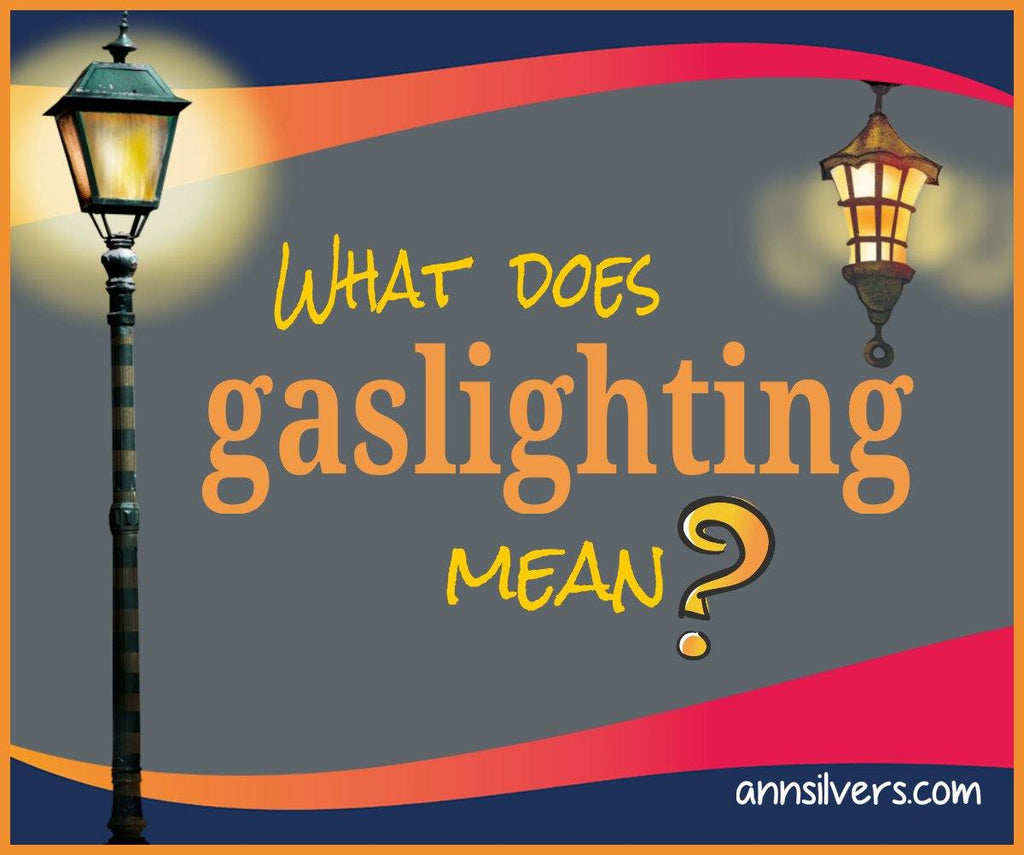What is Gaslighting Emotional Abuse?

Are you wondering:
Gaslighting is a way of messing with someone’s mind. It makes you question what you see, feel, and remember.
It often starts with small denials or comments that make you think you’re “misremembering” things.
Over time, it can shake your confidence and make you doubt your own perception of things.
In this post, I’ll talk about what gaslighting means. We’ll go over the tactics that gaslighters use and how to spot it in your own relationships. Once you understand these behaviors, you can start to take back control of your reality and break free from this toxic dynamic.
What's in This Post
| Gaslighting Meaning and Definition |
| The Origins of the Term Gaslighting |
| Why do Gaslighters Gaslight? |
|
3 Toxic Tactics of Gaslighters: Denial, Trivializing, Withholding |
| Denial Mind Games: How Gaslighters Twist Your Memories and Experiences |
| Partner Abuse Books |
Gaslighting Meaning and Definition

Gaslighting definition: Gaslighting is a verb that dictionary.com defines as "to cause a person to doubt his or her sanity through the use of psychological manipulation."
Gaslighting is an insidious form of emotional abuse where the abuser manipulates their target into doubting their perceptions, thoughts, and memories.
The Origins of the Term Gaslighting
Gaslight is a play by Patrick Hamilton set in the era when gas lamps lit homes and streets.
The Gaslight movie starring Charles Boyer and Ingrid Bergman was adapted from the play in 1944.
The term gaslighting, which refers to trying to make your partner feel crazy, was created based on the story’s depiction of a man trying to do just that.
The male lead character sets up his wife, Paula, to slowly undermine her belief in her perceptions of things. He moves items from where she put them and then criticizes her for “losing” them. He creates the illusion that he is leaving the house every night, but doubles back to enter the attic so that he can search through her dead aunt’s things looking for valuable jewels. He accuses his wife of being delusional to explain the footsteps she hears in the attic and the dimming of the house gaslights caused by him turning on the attic lamp.
"Suddenly, I'm beginning not to trust my memory at all."
--Paula, in Gaslight
Why do Gaslighters Gaslight?
Gaslighting occurs when someone intentionally twists your perception of reality for their own gain.
That gain may be to:
- win a fight,
- cover-up their actions,
- make you think something is true when it is not,
- make you think something is false when it is true, or
- undermine your trust in yourself.
Manipulative people can use gaslighting to abuse anyone within their circle of influence: partners, family members, co-workers, acquaintances, or followers.
3 Toxic Tactics of Gaslighters: Denial, Trivializing, Withholding

Denial, trivializing, and withholding are key characteristics of gaslighting. These tactics are commonly used by the gaslighter to manipulate and undermine their target’s sense of reality and self-worth.
Here’s how each of these behaviors function within gaslighting:
1. Denial
Denial involves the gaslighter outright rejecting or dismissing your version of events or feelings. The gaslighter might deny having said or done something harmful, even if there’s clear evidence to the contrary.
This can make you question their memory or perception, contributing to self-doubt.
Common phrases include:
- "That never happened."
- "You’re making things up."
- "I don’t remember saying that."
(I'll expand on this in an upcoming section: Denial Mind Games: How Gaslighters Twist Your Memories and Experiences.)
2. Trivializing
In trivializing, the gaslighter downplays or belittles your feelings, experiences, or concerns.
This makes you feel as though your emotions are invalid or exaggerated. By making you feel that your reactions are insignificant, the gaslighter dismisses the legitimacy of your perspective.
Common expressions include:
- "You’re overreacting."
- "It’s not that big of a deal."
- "You’re too sensitive."
3. Withholding
Withholding involves the gaslighter refusing to engage in meaningful communication. This can include pretending not to understand, refusing to listen, or declining to share information.
By withholding conversation or emotional support, the gaslighter creates frustration and confusion, often leaving you feeling isolated and powerless.
Common examples are:
- "I don’t want to discuss this."
- "You’re just confusing me."
- "I don’t know what you’re talking about."
These behaviors serve to undermine your confidence and sense of reality, making you more reliant on the gaslighter for validation and creating a cycle of control and manipulation.
Denial Mind Games: How Gaslighters Twist Your Memories and Experiences
Gaslighters manipulate your perception of reality to keep you off balance and in doubt.
They may twist facts, actions, and conversations to make you question your own memory and judgment.
You’ll find yourself second-guessing even the most straightforward moments—what you saw, heard, or said—until you feel as if your grip on reality is slipping.
A gaslighter may try to convince you that:
-
what you saw, you didn’t see,
-
what you didn’t see, you saw,
-
what you said, you didn’t say,
-
what you didn’t say, you said,
-
what they said, they didn't say,
-
what they didn't say, they said,
-
what they did, they didn't do,
-
what they didn't do, they did,
-
what you heard, you didn’t hear, or
-
what you didn’t hear, was there for the hearing.

Gaslighting undermines your sense of reality and trust in your perceptions, and it shuts down conversation about topics the manipulator wants to avoid.
For More on Gaslighting
Check out my other blog post: Gaslighting Quotes
Partner Abuse Books
For more information about all forms of Partner Abuse including gaslighting, check out my related books:
- Ann Silvers










Comments 0